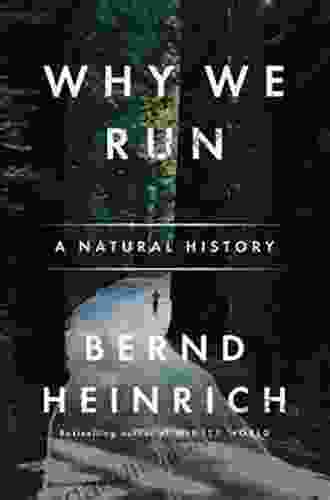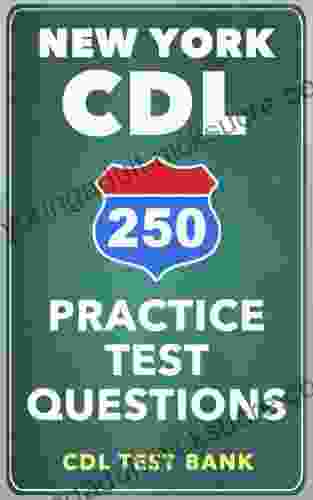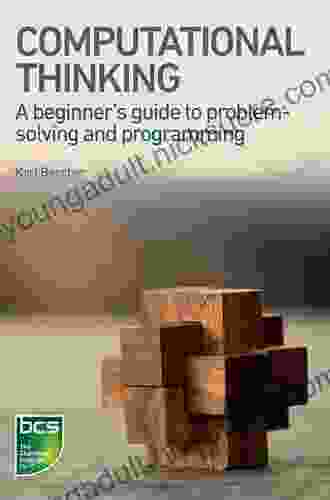Why We Run Natural History: Uncovering the Evolutionary Roots of Human Endurance

Running is a fundamental part of human nature. We do it for fun, for fitness, and even for transportation. But why do we run? What is it about this activity that has captivated us for centuries?
4.3 out of 5
| Language | : | English |
| File size | : | 3093 KB |
| Text-to-Speech | : | Enabled |
| Screen Reader | : | Supported |
| Enhanced typesetting | : | Enabled |
| Word Wise | : | Enabled |
| Print length | : | 306 pages |
The answer, it turns out, is rooted in our evolutionary history. Running was essential for our early ancestors who hunted for food and scavenged for resources. Those who could run faster and longer had a better chance of survival.
Over time, our bodies adapted to running. We developed long, slender legs that are efficient for covering long distances. We also developed strong hearts and lungs that can pump oxygen-rich blood to our muscles.
Today, running is no longer essential for our survival. But it remains a popular activity for many reasons. Running is a great way to get exercise, relieve stress, and improve our overall health.
The Benefits of Running
There are many benefits to running, both physical and mental. Running can help us:
- Lose weight and keep it off
- Reduce our risk of heart disease, stroke, and other chronic diseases
- Improve our mood and reduce stress
- Boost our energy levels
- Sleep better
- Connect with the natural world
Running is a versatile activity that can be enjoyed by people of all ages and fitness levels. Whether you're a beginner or a seasoned runner, there are many ways to incorporate running into your life.
How to Start Running
If you're new to running, it's important to start slowly and gradually increase your distance and intensity. Here are a few tips for beginners:
- Start with short runs of 10-15 minutes, three times per week.
- Gradually increase your distance by 10% each week.
- Listen to your body and take rest days when you need them.
- Find a running partner or group to help you stay motivated.
Once you're comfortable running for 30 minutes, you can start to increase your speed or distance. You can also try interval training, which alternates between periods of running and walking or resting.
Running and the Natural World
Running is a great way to connect with the natural world. Whether you're running through a park, on a trail, or along the beach, you'll be surrounded by beautiful scenery and fresh air.
Running can also help you appreciate the changing seasons. In the spring, you can enjoy the blooming flowers and the sound of birds singing. In the summer, you can run through fields of wildflowers and cool off in a swimming hole. In the fall, you can enjoy the changing leaves and the crisp autumn air. And in the winter, you can run through the snow and enjoy the peace and quiet of the season.
Running is a great way to get exercise, improve your health, and connect with the natural world. So what are you waiting for? Get out there and start running!
Running is a fundamental part of human nature. It's an activity that has been with us for thousands of years, and it's still enjoyed by people all over the world today.
Whether you're running for fun, fitness, or transportation, there are many benefits to be gained from this activity. So get out there and start running! You won't regret it.
4.3 out of 5
| Language | : | English |
| File size | : | 3093 KB |
| Text-to-Speech | : | Enabled |
| Screen Reader | : | Supported |
| Enhanced typesetting | : | Enabled |
| Word Wise | : | Enabled |
| Print length | : | 306 pages |
Do you want to contribute by writing guest posts on this blog?
Please contact us and send us a resume of previous articles that you have written.
 Fiction
Fiction Non Fiction
Non Fiction Romance
Romance Mystery
Mystery Thriller
Thriller SciFi
SciFi Fantasy
Fantasy Horror
Horror Biography
Biography Selfhelp
Selfhelp Business
Business History
History Classics
Classics Poetry
Poetry Childrens
Childrens Young Adult
Young Adult Educational
Educational Cooking
Cooking Travel
Travel Lifestyle
Lifestyle Spirituality
Spirituality Health
Health Fitness
Fitness Technology
Technology Science
Science Arts
Arts Crafts
Crafts DIY
DIY Gardening
Gardening Petcare
Petcare John Sonmez
John Sonmez Pete Dunne
Pete Dunne Angela Stancar Johnson
Angela Stancar Johnson Mtg Editorial Board
Mtg Editorial Board Miranda Green
Miranda Green Latonya J Trotter
Latonya J Trotter Shreya Ramachandran
Shreya Ramachandran Eliot Schrefer
Eliot Schrefer Julia Reed
Julia Reed Joan Jacobs Brumberg
Joan Jacobs Brumberg Tirzah Price
Tirzah Price Jorge Ramos Mizael
Jorge Ramos Mizael Lutz Hanseroth
Lutz Hanseroth Tom Chatfield
Tom Chatfield Mark Remy
Mark Remy Leanne Ely
Leanne Ely Andy Farrell
Andy Farrell Aaron Wilson
Aaron Wilson Jeanne Godfrey
Jeanne Godfrey Christopher O Kennon
Christopher O Kennon George E Hein
George E Hein Keylee C Hargis
Keylee C Hargis Milton Roth
Milton Roth Eric Schmitz
Eric Schmitz Guy Evans
Guy Evans Jim Posewitz
Jim Posewitz Patrick Ejeke
Patrick Ejeke Patrick Pickens
Patrick Pickens Bob Clouser
Bob Clouser Frank Deford
Frank Deford Ryan Beck
Ryan Beck Angela C Wu
Angela C Wu Kathy Hoopmann
Kathy Hoopmann Jason Hogan
Jason Hogan Ellen J Langer
Ellen J Langer Angelo Lowery
Angelo Lowery Siena Cherson Siegel
Siena Cherson Siegel Joseph Phillips
Joseph Phillips Otto Rahn
Otto Rahn Mark Synnott
Mark Synnott George Noory
George Noory Nicholas Epley
Nicholas Epley Richard L Sites
Richard L Sites Lindsay Ford
Lindsay Ford Lisa Marie Mercer
Lisa Marie Mercer Joseph Mazur
Joseph Mazur Kim Dragoner
Kim Dragoner Tristan Higbee
Tristan Higbee Christina Hillsberg
Christina Hillsberg Mometrix
Mometrix Lucy Postgate
Lucy Postgate Sandra Steingraber
Sandra Steingraber Richard Bate
Richard Bate R E Burrillo
R E Burrillo Lin Wellford
Lin Wellford Kim West
Kim West Kevin Thomas
Kevin Thomas Mark Wells
Mark Wells Mark Rosenman
Mark Rosenman Jessica Wolstenholm
Jessica Wolstenholm Mary Pipher
Mary Pipher Tiara Mcclure
Tiara Mcclure Caryl Say
Caryl Say Murtaza Haider
Murtaza Haider Tovar Cerulli
Tovar Cerulli David C Keehn
David C Keehn Cheryl Alkon
Cheryl Alkon Walter Beede
Walter Beede Cap N Fatty Goodlander
Cap N Fatty Goodlander Rebecca Serle
Rebecca Serle Samuel B Green
Samuel B Green Ben Ehrenreich
Ben Ehrenreich K Moriyasu
K Moriyasu Alessio Mangoni
Alessio Mangoni Ken Dryden
Ken Dryden Catherine Mccord
Catherine Mccord Chip Heath
Chip Heath Louis Martin
Louis Martin Sharon Strand Ellison
Sharon Strand Ellison Judith Hoare
Judith Hoare Danil Zburivsky
Danil Zburivsky Seth Lloyd
Seth Lloyd Dave Duncan
Dave Duncan Tim Hannigan
Tim Hannigan Kristen S Kurland
Kristen S Kurland William E Hearn
William E Hearn Andy Peloquin
Andy Peloquin Daddilife Books
Daddilife Books D M Davis
D M Davis Karl E Peace
Karl E Peace Mirabai Starr
Mirabai Starr Yvonne Choquet Bruhat
Yvonne Choquet Bruhat Jonathan Gottschall
Jonathan Gottschall Jeffrey Thurston
Jeffrey Thurston Stephen Cheney
Stephen Cheney Rashaun Johnson
Rashaun Johnson Dwight E Neuenschwander
Dwight E Neuenschwander Johnson Egonmwan
Johnson Egonmwan Serena B Miller
Serena B Miller Joe Berardi
Joe Berardi Scott Turner
Scott Turner Sandy Tolan
Sandy Tolan Peter Gibson
Peter Gibson Carlos Acevedo
Carlos Acevedo Shalabh Aggarwal
Shalabh Aggarwal Angelo Tropea
Angelo Tropea Jerry Toner
Jerry Toner Nick Bradley
Nick Bradley Pete Sampras
Pete Sampras Violet White
Violet White Schoolhouse Heaven
Schoolhouse Heaven Mark W Steege
Mark W Steege Eli Wilson
Eli Wilson Bradley T Erford
Bradley T Erford Nicole Smith
Nicole Smith Ben Campbell
Ben Campbell Elizabeth Kaledin
Elizabeth Kaledin Jules Brown
Jules Brown Margaret Visser
Margaret Visser S L Macgregor Mathers
S L Macgregor Mathers Stephen Jungmann
Stephen Jungmann Manik Joshi
Manik Joshi Petros Efthymiou
Petros Efthymiou Massimo Florio
Massimo Florio William Bryant Logan
William Bryant Logan Jeremy Klaff
Jeremy Klaff Arlin Smith
Arlin Smith Gillian Price
Gillian Price Chris Santella
Chris Santella Angel Burns
Angel Burns Deborah Wall
Deborah Wall Neveen Musa
Neveen Musa Rebecca P Cohen
Rebecca P Cohen Andy Crowe
Andy Crowe Adam Skolnick
Adam Skolnick Michael Anthony
Michael Anthony Lynn Palm
Lynn Palm Fredrik Backman
Fredrik Backman Tom Dymond
Tom Dymond Matthew D Dewar
Matthew D Dewar Chef Maggie Chow
Chef Maggie Chow John Geiger
John Geiger Chuck Weikert
Chuck Weikert Richard G Brown
Richard G Brown Kenneth R Ginsburg
Kenneth R Ginsburg Ted Sandling
Ted Sandling Harry Fairhead
Harry Fairhead Kent David Kelly
Kent David Kelly Robin Benway
Robin Benway Elly Molina
Elly Molina Shenila Khoja Moolji
Shenila Khoja Moolji Michael V Uschan
Michael V Uschan Kathy Freston
Kathy Freston Rodney Castleden
Rodney Castleden Jordan Summers
Jordan Summers Mercedes Pollmeier
Mercedes Pollmeier Charney Herst
Charney Herst Phil Burt
Phil Burt Humberto G Garcia
Humberto G Garcia Robyn Ryle
Robyn Ryle Jenna Blough
Jenna Blough Leonard Lueras
Leonard Lueras Dawn Griffiths
Dawn Griffiths Ingrid S Clay
Ingrid S Clay Wayne Mcghie
Wayne Mcghie Alex Wolf
Alex Wolf Robert Lindsay
Robert Lindsay Andy Schell
Andy Schell Cynthia Nims
Cynthia Nims Tea Rozman Clark
Tea Rozman Clark Joshua Clark
Joshua Clark Andy Dowsett
Andy Dowsett Ruth Benedict
Ruth Benedict Janet Menzies
Janet Menzies Donald N Yates
Donald N Yates Forrest Maready
Forrest Maready Stefan Hunziker
Stefan Hunziker Jeffrey Lee
Jeffrey Lee Warren Sande
Warren Sande William Ayers
William Ayers Sam Bleakley
Sam Bleakley Rafael Gordillo Naranjo
Rafael Gordillo Naranjo Cate Tiernan
Cate Tiernan Dave Gray
Dave Gray Andy Mitchell
Andy Mitchell David Herres
David Herres James M Johnston
James M Johnston Linda Sivertsen
Linda Sivertsen Oliver Burkeman
Oliver Burkeman Johnny Molloy
Johnny Molloy Sir Edmund Hillary
Sir Edmund Hillary Laura Hillman
Laura Hillman Dean Beaumont
Dean Beaumont Stephen Lynch
Stephen Lynch Eugene P Northrop
Eugene P Northrop Jo May
Jo May Martin Volken
Martin Volken Rosie Daley
Rosie Daley Kelly Corrigan
Kelly Corrigan John C Maxwell
John C Maxwell Capn Fatty Goodlander
Capn Fatty Goodlander Jennifer Bohnet
Jennifer Bohnet Richard Lemaster
Richard Lemaster Robert Dudley
Robert Dudley Joel J Lerner
Joel J Lerner Caspar Melville
Caspar Melville Thomas Gilovich
Thomas Gilovich Robyn Harding
Robyn Harding Connie Schultz
Connie Schultz Brian Cain
Brian Cain Rachel Kowert
Rachel Kowert Devaki Lakshmi
Devaki Lakshmi Kristen Jervis Cacka
Kristen Jervis Cacka Beth A Leonard
Beth A Leonard Angela Thayer
Angela Thayer T L Payne
T L Payne Peter Townsend
Peter Townsend T R Fehrenbach
T R Fehrenbach Roland A Boucher
Roland A Boucher Tim O Connor
Tim O Connor Ashley Rickards
Ashley Rickards Christina Reese
Christina Reese Mandee Heller Adler
Mandee Heller Adler Barry Pickthall
Barry Pickthall Lawrence Goldstone
Lawrence Goldstone J D Swanson
J D Swanson Anna Rashbrook
Anna Rashbrook Kristina Statler
Kristina Statler Thomas Golf
Thomas Golf Lee Cronk
Lee Cronk Rebecca Solnit
Rebecca Solnit Elizabeth Hunter
Elizabeth Hunter Jeffrey T Richelson
Jeffrey T Richelson Nicholas Jubber
Nicholas Jubber Rick Vaive
Rick Vaive Patrick M Lencioni
Patrick M Lencioni Stewart Shapiro
Stewart Shapiro Jim Prime
Jim Prime Peter Finch
Peter Finch Emma Dalton
Emma Dalton Stefanie K Johnson
Stefanie K Johnson Ryan Bow
Ryan Bow Keith Crowley
Keith Crowley Emiko Jean
Emiko Jean Robb Manning
Robb Manning Scott Meyer
Scott Meyer Ray Walker
Ray Walker Kate Le Roux
Kate Le Roux Rachel Hutt Phd
Rachel Hutt Phd Stephen Rea
Stephen Rea Diana Nyad
Diana Nyad Marie Myung Ok Lee
Marie Myung Ok Lee Natalie Rhodes
Natalie Rhodes Florian Freistetter
Florian Freistetter Robert Urban
Robert Urban Jane M Healy
Jane M Healy Bret A Moore
Bret A Moore Robert Kirk
Robert Kirk Shane O Mara
Shane O Mara Baby Professor
Baby Professor Tim Macwelch
Tim Macwelch Andrea Lankford
Andrea Lankford Sam Fury
Sam Fury Tania N Shah
Tania N Shah Robert Zubek
Robert Zubek Colby Coombs
Colby Coombs Tim Larkin
Tim Larkin Ellen Frank
Ellen Frank Mark Shepherd
Mark Shepherd Howard Davis
Howard Davis Rebecca Hemmings
Rebecca Hemmings Marie Brennan
Marie Brennan Madison Lee
Madison Lee Muako Maepa
Muako Maepa Mitch Horowitz
Mitch Horowitz Andy Puddicombe
Andy Puddicombe Matt Vincent
Matt Vincent Bob Gordon
Bob Gordon Angel Millar
Angel Millar David Kinney
David Kinney Jeff Fleischer
Jeff Fleischer Carol Ann Gillespie
Carol Ann Gillespie Wynne Foster
Wynne Foster Kari Marie Norgaard
Kari Marie Norgaard Jodi Picoult
Jodi Picoult Cory Mortensen
Cory Mortensen Meg Long
Meg Long Mark Verstegen
Mark Verstegen Lynn Lyons
Lynn Lyons Troy A Hill
Troy A Hill Gary B Meisner
Gary B Meisner Frederick Aardema
Frederick Aardema Mark Lester
Mark Lester Charlotte Klaar Phd
Charlotte Klaar Phd Tanya Lee Stone
Tanya Lee Stone Warren St John
Warren St John Keith Elliot Greenberg
Keith Elliot Greenberg Miles Olson
Miles Olson Judith S Beck
Judith S Beck Richard Lee Byers
Richard Lee Byers Belinda Norton
Belinda Norton Madeleine Roux
Madeleine Roux Rebecca Boggs Roberts
Rebecca Boggs Roberts Raynor Winn
Raynor Winn Teresa Parker
Teresa Parker Bill Schneider
Bill Schneider Nikki Ace
Nikki Ace George Megre
George Megre Jeffrey Bernstein
Jeffrey Bernstein Third Edition Kindle Edition
Third Edition Kindle Edition Tovah Feldshuh
Tovah Feldshuh Yuu Tanaka
Yuu Tanaka Harold S Koplewicz
Harold S Koplewicz Dave Smith
Dave Smith Bernd Heinrich
Bernd Heinrich Diana Winston
Diana Winston Daniel Friedmann
Daniel Friedmann Stacy Mccullough
Stacy Mccullough Richard Hibshman
Richard Hibshman Tigran Bagdasaryan
Tigran Bagdasaryan Rawdon Wyatt
Rawdon Wyatt Scott Alan Johnston
Scott Alan Johnston Tom Allen
Tom Allen Lidia Bastianich
Lidia Bastianich Rodney Paul
Rodney Paul James Quinn
James Quinn Bradley Charbonneau
Bradley Charbonneau Mark Kernion
Mark Kernion Chanel Craft Tanner
Chanel Craft Tanner Rachel Connelly
Rachel Connelly Erich Fromm
Erich Fromm Hajime Isayama
Hajime Isayama Richard A Muller
Richard A Muller Bob Swope
Bob Swope Derek M Steinbacher
Derek M Steinbacher Kat Anderson
Kat Anderson Roger Craig
Roger Craig Gregory J Davenport
Gregory J Davenport M J Fievre
M J Fievre Jeff Mach
Jeff Mach Jessica Jung
Jessica Jung Christian Heath
Christian Heath Donna Mott
Donna Mott William D Lopez
William D Lopez Jonah Lehrer
Jonah Lehrer Tim Thayne
Tim Thayne Barak Ariel
Barak Ariel David E Jones
David E Jones Marilyn Burgos
Marilyn Burgos Joyce Yang
Joyce Yang Jessica Nordell
Jessica Nordell G K Derosa
G K Derosa Ron Douglas
Ron Douglas Irene Gut Opdyke
Irene Gut Opdyke L S Boos
L S Boos Mark J Musser
Mark J Musser Ruby Lang
Ruby Lang Samir P Desai
Samir P Desai Robin Yocum
Robin Yocum Andy Tyson
Andy Tyson United States Government Us Army
United States Government Us Army Andy Jurinko
Andy Jurinko Kevin Hunter
Kevin Hunter Robert E Stake
Robert E Stake Robin Ray Green
Robin Ray Green Alberta Hawse
Alberta Hawse George Johnson
George Johnson Thais Nye Derich
Thais Nye Derich Karen Sternheimer
Karen Sternheimer Ryan D Agostino
Ryan D Agostino Hourly History
Hourly History Lisa Preston
Lisa Preston Emily Nielson
Emily Nielson Lois A Ritter
Lois A Ritter Jay Matthews
Jay Matthews Jim Saccomano
Jim Saccomano Christian Wiggins
Christian Wiggins Dan Ariely
Dan Ariely Dennis Rainey
Dennis Rainey Ben Bleiweiss
Ben Bleiweiss Germano Dalcielo
Germano Dalcielo Greg Prato
Greg Prato Angela Eckhoff
Angela Eckhoff Ariel Henley
Ariel Henley Israelin Shockness
Israelin Shockness Sylvester Nemes
Sylvester Nemes Joe Peta
Joe Peta Joy Williams
Joy Williams Stephen Grossberg
Stephen Grossberg Nicholas D Kristof
Nicholas D Kristof Susan Burton
Susan Burton Angelina J Steffort
Angelina J Steffort Karl Beecher
Karl Beecher Ron Jeffries
Ron Jeffries Marc Charles
Marc Charles Avinash Navlani
Avinash Navlani Rod Powers
Rod Powers Elizabeth Foss
Elizabeth Foss Chris Chelios
Chris Chelios Neil Hawkesford
Neil Hawkesford John Samuel Barnett
John Samuel Barnett Ashley P Martin
Ashley P Martin Stephanie Land
Stephanie Land W Todd Woodard
W Todd Woodard Emily Souder
Emily Souder Dr Eva Beaulieu
Dr Eva Beaulieu Tj Faultz
Tj Faultz Angela Smith
Angela Smith Angela Leslee
Angela Leslee Carlo Rovelli
Carlo Rovelli Kyle Graves
Kyle Graves Paul Cobley
Paul Cobley Margaret M Quinlan
Margaret M Quinlan David Goodman
David Goodman Jenna Helwig
Jenna Helwig Stuart Lawrence
Stuart Lawrence Erin Moulton
Erin Moulton Michael Driscoll
Michael Driscoll Tina Nelson
Tina Nelson Gerard Siggins
Gerard Siggins Robyn Wideman
Robyn Wideman Karen Elliott House
Karen Elliott House Laura Bogen
Laura Bogen John B Nici
John B Nici Afra J Zomorodian
Afra J Zomorodian Tara Sim
Tara Sim Dan Heath
Dan Heath Jon Ronson
Jon Ronson Douglas Henderson Jr
Douglas Henderson Jr Liv Ryan
Liv Ryan Rufus Estes
Rufus Estes Kim Foley Mackinnon
Kim Foley Mackinnon Scott Stillman
Scott Stillman Michele Borba
Michele Borba Donna Helen Crisp Jd Msn Rn Pmhcns Bc
Donna Helen Crisp Jd Msn Rn Pmhcns Bc Angeline Boulley
Angeline Boulley Michael Tomasello
Michael Tomasello Jamie Kuykendall
Jamie Kuykendall Howell Raines
Howell Raines Katrina Cope
Katrina Cope David Graeber
David Graeber Christopher Nyerges
Christopher Nyerges Kevin J Gaston
Kevin J Gaston Angelo Chiari
Angelo Chiari Margaret Jordan Halter
Margaret Jordan Halter Jay Griffiths
Jay Griffiths Kathryn Miles
Kathryn Miles Wendy Rosenoff
Wendy Rosenoff Mike Chambers
Mike Chambers Donald R Prothero
Donald R Prothero Sabbithry Persad Mba
Sabbithry Persad Mba Jodi Shabazz
Jodi Shabazz Dhonielle Clayton
Dhonielle Clayton Rebecca Eanes
Rebecca Eanes Viviana Altuve
Viviana Altuve Rob Willson
Rob Willson Steve Hindman
Steve Hindman Judea Pearl
Judea Pearl Nathaniel Rich
Nathaniel Rich Jenny Smith
Jenny Smith Ed Stafford
Ed Stafford
Light bulbAdvertise smarter! Our strategic ad space ensures maximum exposure. Reserve your spot today!
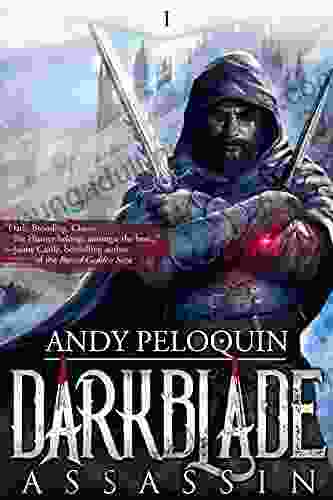
 David MitchellDarkblade: A Gripping Dark Epic Fantasy Novel That Will Keep You on the Edge...
David MitchellDarkblade: A Gripping Dark Epic Fantasy Novel That Will Keep You on the Edge... Giovanni MitchellFollow ·19.7k
Giovanni MitchellFollow ·19.7k George MartinFollow ·6k
George MartinFollow ·6k Isaac AsimovFollow ·14.3k
Isaac AsimovFollow ·14.3k Joseph HellerFollow ·13.4k
Joseph HellerFollow ·13.4k Rod WardFollow ·14.8k
Rod WardFollow ·14.8k Carter HayesFollow ·4.3k
Carter HayesFollow ·4.3k Ryūnosuke AkutagawaFollow ·12.8k
Ryūnosuke AkutagawaFollow ·12.8k Jan MitchellFollow ·8.4k
Jan MitchellFollow ·8.4k

 Devon Mitchell
Devon MitchellDelve into the Comprehensive World of Cartridges: A...
In the realm of firearms, cartridges stand...
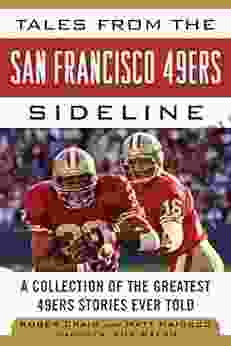
 Joseph Conrad
Joseph ConradTales From The San Francisco 49ers Sideline: A Look...
The San Francisco 49ers are one of the most...

 Ervin Bell
Ervin BellArcGIS Desktop 10: A Comprehensive GIS Tutorial for...
Geographic information...

 Reed Mitchell
Reed MitchellPhysiology Pretest Self Assessment And Review 14th...
Accurately gauge your physiology knowledge and...
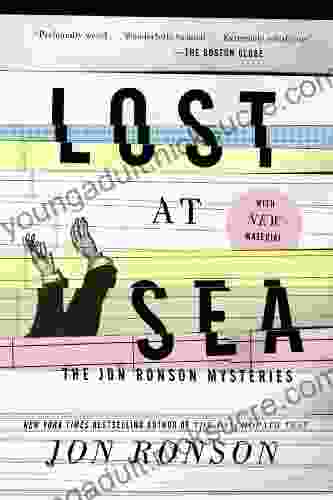
 Devin Ross
Devin RossLost At Sea: The Unbelievable True Story of the Jon...
In 2009, journalist Jon Ronson set out to...
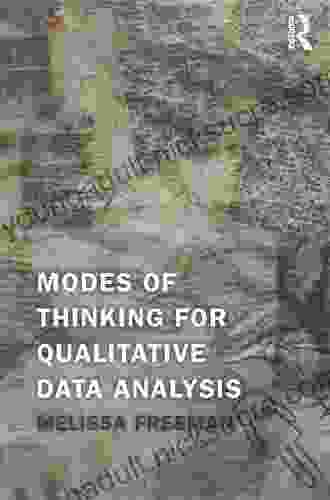
 Shane Blair
Shane BlairModes of Thinking for Qualitative Data Analysis
Qualitative data analysis is a complex...
4.3 out of 5
| Language | : | English |
| File size | : | 3093 KB |
| Text-to-Speech | : | Enabled |
| Screen Reader | : | Supported |
| Enhanced typesetting | : | Enabled |
| Word Wise | : | Enabled |
| Print length | : | 306 pages |


